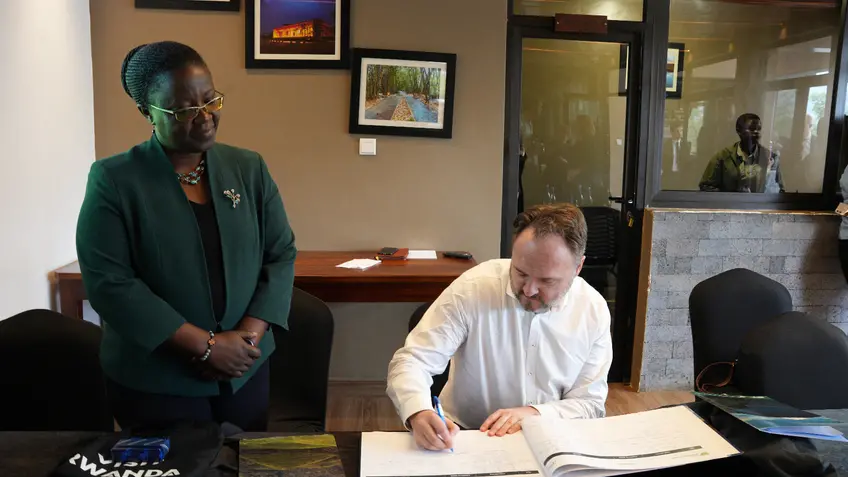Denmark and Rwanda Launch Green Partnership To Increase Climate Ambitions in 92 Countries
Denmark and Rwanda announce a joint presidency to support 92 developing countries in developing and implementing more ambitious national climate plans.
Kigali, Rwanda, 24 January 2024 - Minister for Development Cooperation and Global Climate Policy, Dan Jørgensen, kicked off his work as co-chair of the NDC Partnership organization this week with his Rwandan counterpart, Minister of Environment Jeanne d'Arc Mujawamariya, during a Danish ministerial visit to Rwanda this week. The NDC Partnership is a global collaboration that supports developing countries in preparing and implementing their own national climate plans (NDCs).
"Rwanda is a climate frontrunner both in Africa and globally, and therefore the Danish government has a great interest in a close partnership with Rwanda. The chairmanship of the NDC partnership with Rwanda will be important in the work of translating the good results from COP28 into concrete efforts in the individual countries. Together with Rwanda, we can work to ensure that developing countries can realize their climate plans and at the same time increase their ambitions in the new climate plans that will be prepared for COP30 in Brazil. We stand strong together with Rwanda to increase the ambitions for global climate action and keep the 1.5ºC target within reach," says Dan Jørgensen.
The development of climate plans is based on the countries' own wishes, needs and priorities. Denmark and Rwanda are leading the work of mapping the 92 countries' climate priorities. This may involve finding new crops to grow when the climate causes more drought, reorganizing the health sector when higher temperatures allow malaria mosquitoes to thrive in previously malaria-free areas, or building dikes and dams to counter rising water levels. It could also be lowering countries' emissions, for example through increased use of electric vehicles.
The overall goal of the partnership is to support countries to accelerate the implementation of their climate plans and increase ambition to reach the Paris Agreement targets. The NDC Partnership is widely recognized as a key player in raising global climate ambition.
More Solar Panels and Mini Hydropower Plants
During his visit to Kigali, Dan Jørgensen also focused on the Danish involvement in the African-led initiative Accelerated Partnership for Renewables in Africa (APRA), which aims to accelerate the roll-out of renewable energy in Africa.
"APRA inspires more green action while helping to deliver on the ambitious global COP28 renewable energy targets. It will not only inspire other countries, but also support the ambitious African countries that are already in the process of accelerating the energy transition. But the roll-out requires good framework conditions such as legislation and well-functioning institutions that can attract investment and commitment from the private sector. Rwanda is already well underway through the country's Green Fund, which, with support from Denmark, will strengthen the private sector's involvement in the green transition, including in the climate and energy area, for example through greater use of solar panels, mini hydropower plants and energy audits," says Dan Jørgensen.
Approximately half of the Sub-Saharan African populations have no access to energy or face challenges with reliable access. Deploying renewable energy not only powers the plug but is also a tool to create new economic opportunities across the continent and thereby fight poverty. That is why Denmark has been a co-initiator and launched concrete support for APRA at COP28.
Background
The NDC Partnership
The co-chairmanship of the NDC Partnership is for a two-year period from January 1, 2024 to the end of 2025-2026 and is shared between a developing country and a donor country. Rwanda is appointed as co-chair for the current period together with Denmark. From January 2025, a new developing country will join as co-chair, which means that Denmark will have a new co-chair.
The presidency in 2025 coincides with both the Danish EU Presidency and the deadline for the countries of the world to update their National Climate Action Plans (NDCs). This gives Denmark a significant opportunity to play a central role in shaping the international climate agenda and support increased climate ambitions globally.
The NDC Partnership was launched in 2016 by a coalition of countries, institutions and non-state actors following the adoption of the Paris Agreement under the United Nations Framework Convention on Climate Change, UNFCCC. The Partnership now has more than 200 members from around the world. The NDCs form a cornerstone of the Paris Agreement and express countries' respective climate ambitions and contributions to limiting the temperature increase to 1.5°C and to climate-resilient development.
As co-chairs, Denmark and Rwanda will lead the partnership's steering committee, which also includes Colombia, Indonesia, Benin, the United States and the World Bank.
APRA
Accelerated Partnership for Renewables in Africa (APRA). The partnership was launched by Kenyan President Ruto at the African Climate Summit in Nairobi in September 2023 and subsequently consolidated in a declaration at COP28 in December 2023, where the Prime Minister also launched Danish support for the initiative through a number of activities, including DKK 100 million to the African Development Bank's sustainable energy fund, SEFA; approximately DKK 10 million for the Danish Energy Agency's technical support to APRA countries (which do not already have energy governance cooperation); and DKK 18 million for IRENA's facilitation of the partnership. Denmark, together with Germany, Kenya and IRENA, initiated the partnership, which includes selected ambitious African countries (Ethiopia, Rwanda, Namibia and Zimbabwe and Sierra Leone),
The partnership is based on the following concept: 1) technical assistance for improved framework conditions, 2) mobilization of financing, 3) private sector engagement. The partnership is demand-driven and facilitated by country governments with support from IRENA. The first step is the organization of country workshops to identify barriers and opportunities for renewable energy deployment, followed by concrete support to overcome the barriers. Rwanda's country workshop will be held in mid-February.
For more information, please contact pressevagten@um.dk.
